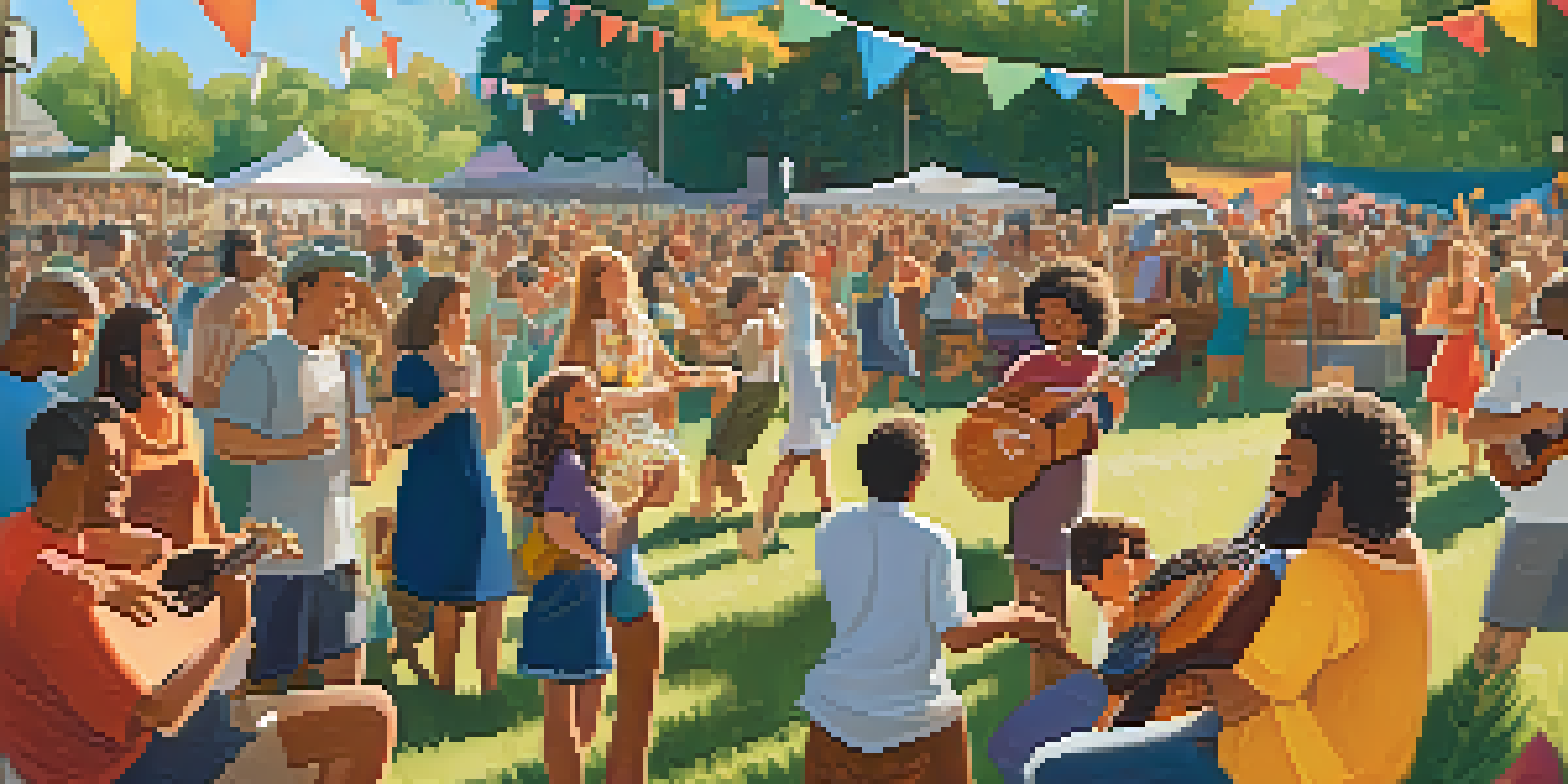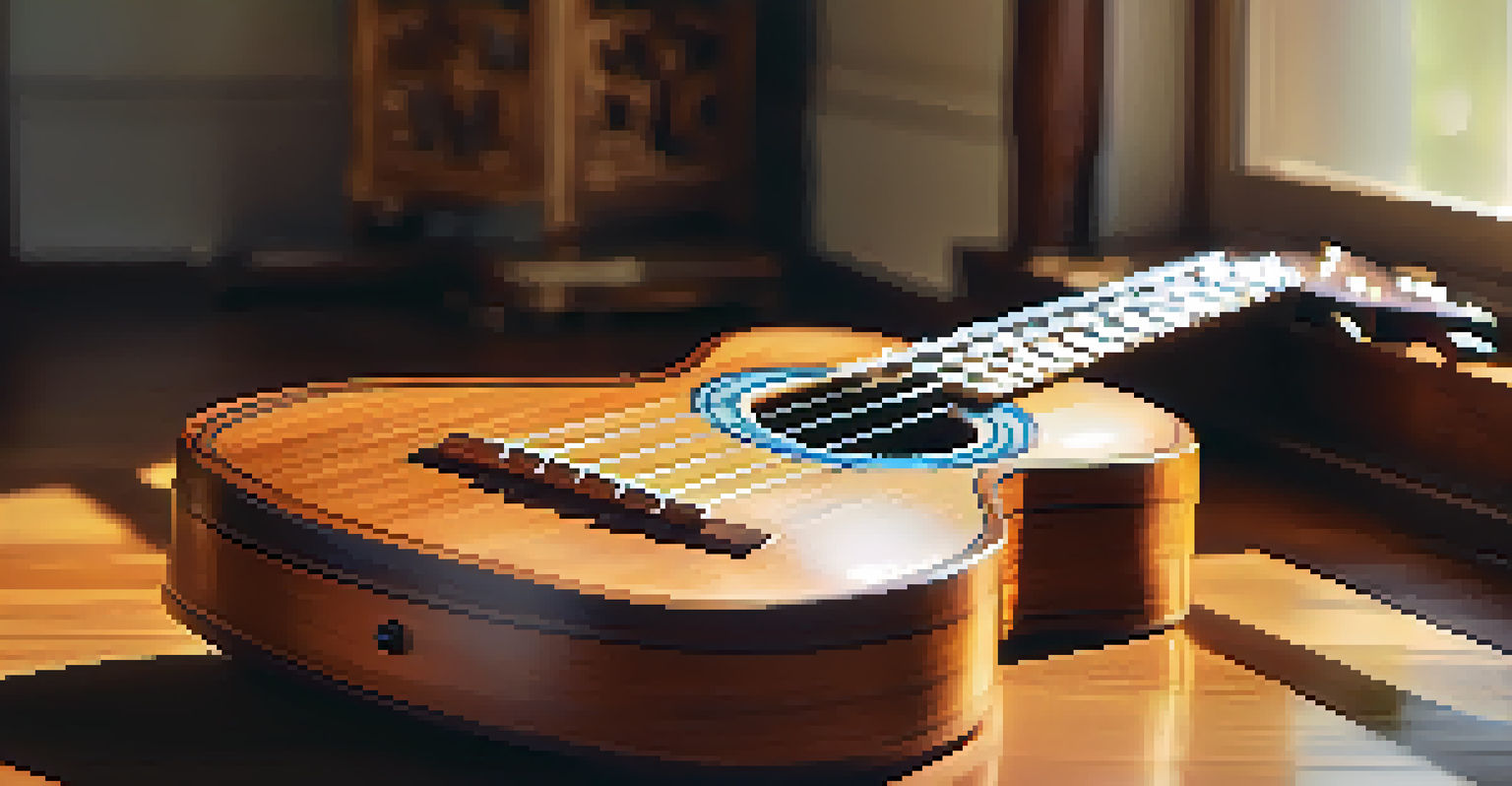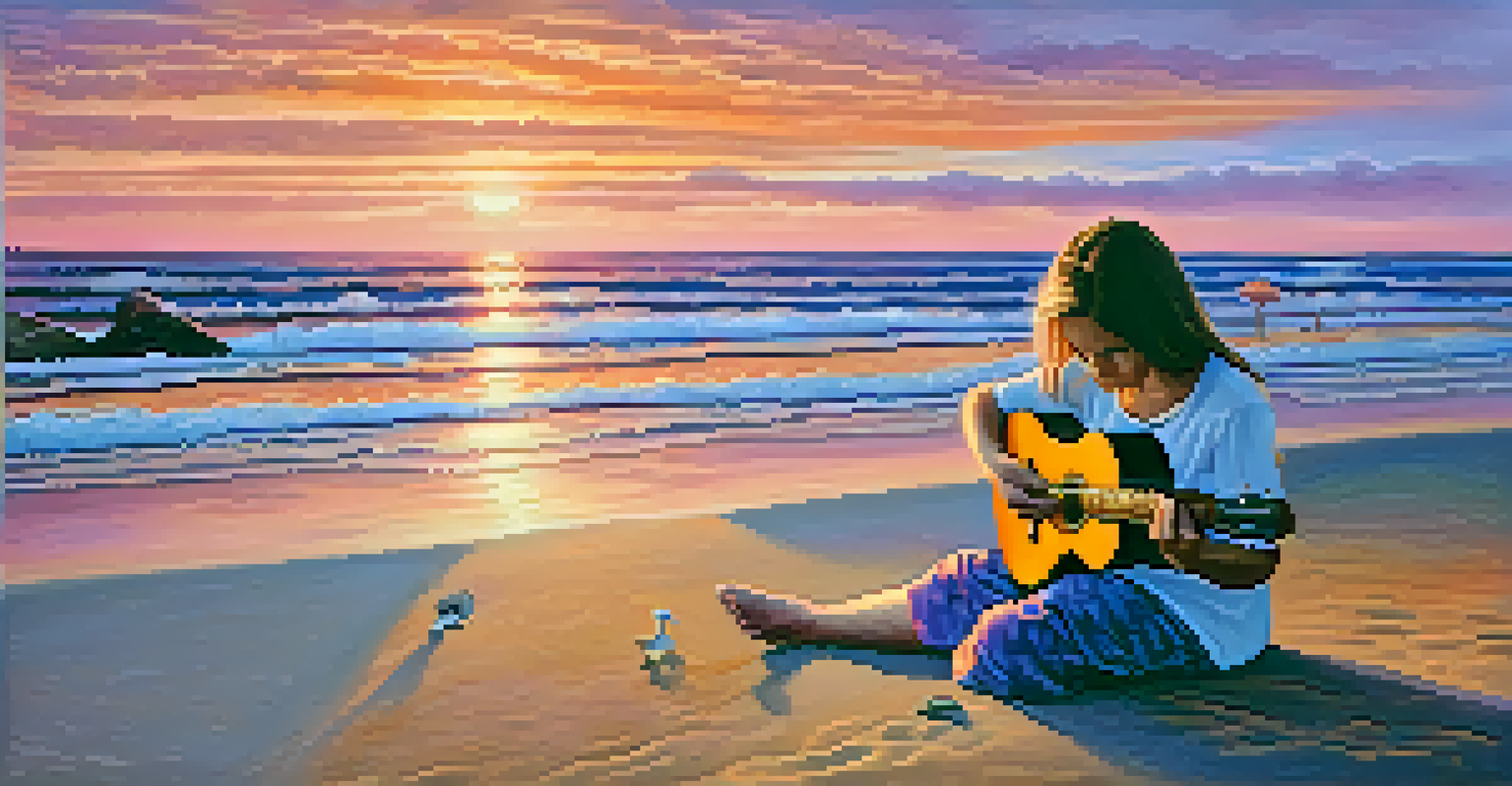The Role of the Ukulele in Folk Storytelling Traditions

The Ukulele: A Brief Introduction to Its History
The ukulele, a small stringed instrument, originated in Hawaii in the 19th century. Its roots trace back to the Portuguese braguinha, which was brought over by immigrants. As it evolved, the ukulele became a symbol of Hawaiian culture and quickly spread to the mainland USA and beyond. This instrument’s joyful sound makes it a perfect companion for storytelling.
Music can change the world because it can change people.
Unlike larger instruments, the ukulele’s size and light weight make it highly accessible. Anyone can pick it up and strum a few chords, making it an excellent tool for communal gatherings. This accessibility means that stories can be told and sung by people of all ages and backgrounds, fostering connection and sharing.
In folk traditions, music often accompanies storytelling, enhancing the narrative and emotional impact. The ukulele’s cheerful tones add a layer of warmth and familiarity, inviting audiences to engage with the stories being told.
Cultural Significance of the Ukulele in Storytelling
The ukulele holds a unique place in various cultures, serving as both a musical instrument and a storytelling tool. In Hawaiian culture, it is often used to narrate historical events and personal tales, bridging the past with the present. This cultural significance enriches the storytelling experience, making it more relatable and engaging.

In many folk traditions, music is a way to preserve history and share lessons. The ukulele’s cheerful sound encourages participation, allowing listeners to join in and share their own stories. This interactive element transforms passive listening into a vibrant community experience, where everyone can contribute.
Ukulele's Role in Storytelling
The ukulele serves as both a musical instrument and a storytelling tool, enhancing narratives across cultures.
Stories told alongside ukulele music often reflect the values, struggles, and joys of the community. For instance, a tale of resilience may be accompanied by an uplifting tune, reinforcing the message and creating a lasting emotional connection.
The Ukulele's Role in Modern Folk Festivals
Folk festivals around the world have embraced the ukulele, showcasing its versatility and charm. These festivals often feature workshops where attendees can learn to play, creating an inclusive environment that fosters community. The ukulele becomes a central part of the festival experience, encouraging shared storytelling through music.
The beautiful thing about learning is that no one can take it away from you.
During these gatherings, performers often tell their stories through original songs, utilizing the ukulele as their primary instrument. This not only highlights the instrument's role in modern folk music but also emphasizes the importance of narrative in musical expression. Each song serves as a vessel for personal or cultural stories.
Moreover, the ukulele's popularity at these events helps to revive traditional storytelling practices. As new generations discover the instrument, they also explore the rich tapestry of stories that have accompanied it, ensuring that these narratives are not lost to time.
Storytelling Through Ukulele: Techniques and Styles
When it comes to storytelling through the ukulele, various techniques can be employed to enhance the narrative. Strumming patterns, fingerpicking, and chord progressions all contribute to the overall mood of the story. By adjusting these elements, a musician can evoke different emotions, from joy to melancholy.
In addition to techniques, the style of playing can also impact storytelling. For instance, a lively, upbeat strum might accompany a humorous tale, while a soft, gentle fingerstyle could enhance a more serious narrative. This dynamic interplay between music and storytelling creates a rich auditory experience for the audience.
Community Connection through Music
Folk festivals celebrate the ukulele by fostering community through shared storytelling and interactive participation.
Furthermore, the lyrics themselves play a crucial role. Crafting lyrics that resonate with the audience allows for deeper connections. When combined with the ukulele’s sound, these stories come to life, making them memorable and impactful.
The Ukulele as a Tool for Personal Expression
On a personal level, the ukulele serves as a powerful outlet for self-expression. Many individuals turn to this instrument to share their own experiences and emotions through song. This personal storytelling can be therapeutic, allowing artists to process their feelings in a creative way.
For many, playing the ukulele is a way to connect with others. Whether performing for friends or sharing songs on social media, individuals can express their unique stories. This not only fosters relationships but also builds a sense of community around shared experiences.
Additionally, personal stories conveyed through ukulele music often resonate with others, creating a ripple effect. As listeners connect with these narratives, they may also feel inspired to share their own stories, continuing the cycle of storytelling and connection.
Celebrating Diversity: Global Ukulele Traditions
The ukulele is not limited to Hawaiian culture; it has found its way into folk traditions around the globe. From the streets of Lisbon to the parks of New York City, people incorporate the ukulele into their own storytelling practices, blending it with local musical styles. This global embrace enriches the instrument's narrative potential.
Different cultures interpret the ukulele in unique ways, reflecting their distinct storytelling traditions. For instance, in some regions, it may accompany tales of folklore, while in others, it might be used to narrate contemporary issues. This diversity showcases how the ukulele can adapt to various contexts and themes.
Global Diversity in Ukulele Traditions
The ukulele has adapted to various cultural contexts worldwide, enriching storytelling practices and connecting diverse communities.
As these global traditions continue to evolve, they create a rich tapestry of stories that highlight the universality of human experience. The ukulele becomes a bridge that connects diverse cultures through shared narratives, reinforcing the idea that storytelling is a fundamental aspect of what it means to be human.
Future of the Ukulele in Storytelling
Looking ahead, the ukulele's influence on storytelling is likely to grow even more. As technology advances, new platforms for sharing music and stories are emerging. This creates opportunities for ukulele players to reach wider audiences and share their narratives in innovative ways.
The rise of social media allows for instant connection and collaboration among storytellers across the globe. Musicians can share their stories with just a click, fostering a community that celebrates the ukulele and the tales it carries. This interconnectedness encourages the blending of different storytelling styles and cultural influences.

Moreover, as educational programs increasingly incorporate music into their curricula, the ukulele can play a vital role in teaching storytelling techniques. By engaging students with this approachable instrument, educators can inspire the next generation of storytellers to explore their own narratives through music.